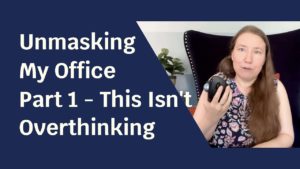You’ve heard this, right?
We’ve all heard lots of advice on the habits of highly successful people. Usually they include things like getting up early, getting physical exercise, working all day, networking with lots of people, rewarding yourself for progress toward goals, etc. That can be depressing if you tend to be an introverted night owl with physical disabilities and an aversion to external motivators. Are you doomed to be unsuccessful?
It’s sometimes felt like that’s what society was telling me. Although I could force myself into these habits for a while, it never lasted long-term. Sometimes it didn’t even last short-term.
Is it true?
But what if something else is going on here? What if it isn’t so much that these are the behaviors that lead to success, but rather that for some people, the behaviors and habits that bring out their best selves happen to align with society’s ideals of what is acceptable, even laudable, behavior.
Then it’s not so much that these behaviors were the key, but rather that these people are lucky enough to be “allowed” to be their best selves, leading to optimal performance, letting them achieve their goals.
rather these people were lucky enough to be “allowed” to be their best selves, leading to optimal performance
What if the rest of us had different habits and behaviors that would lead to our optimal performance? If we did what we needed to do to be our best selves, could we also be wildly successful at our goals?
Speaking for myself, I believe the answer is yes. Over the last few years, I’ve been letting go of a lot of the success-habit mentality that I was taught by well-meaning parents, teachers, role models, and popular books on the subject, and developing a much better understanding of what I need to function at my best. And when I function at my best, I’m able to work well, and do things that I dreamed about but never managed to discipline myself into.
While I don’t have a long-term track record yet—it’s only been a couple of years—this two to three year marker is usually the point at which I either burnout or start waning, but this time I’m gathering momentum and feeling better than ever, and wanting to do more. This time I feel like it is going to be sustainable.
Make it true for you
To be fair, I don’t want to make it sound like all the advice about success is bad advice. Actually, much of it is good advice, especially in its most general form, like “get good sleep.” But not everyone works in the same way, and I don’t think that prescribing that getting up early or going to lots of networking events is the only, or even the best way, to get lots of things done or to make useful contacts. It’s just the best way for some people.
If we did what we needed to do to be our best selves, could we also be wildly successful at our goals?
Even the more general sorts of advice like ”be organized,” can look very different for different people. For one person it might be a clean workspace or a zero inbox, and for another it might look like a jumble of sticky notes or an assistant (human or digital) to remind them of important things.
Especially when you are neurodivergent (autistic like me, ADHD, etc.), a lot of the advice out there often feels more like a straight jacket, holding us back, rather than a rocket ship propelling us forward.
I think that the key is that we each need to find what habits or routines or environments or other factors help us to be our best selves. Different things help each of us achieve our personal optimal performance, and different things detract from it. I’m continually figuring out what works best for me. What are those things for you?





2 Responses
For me, asking myself often “Is this working?” and not being afraid to change it, is the best technique I’ve found. It keeps me from being stuck in something that doesn’t work, and it gives me permission to not freak out that I haven’t found all the ‘right’ things that will work yet. I remind myself often that standing on one foot requires CONSTANT tiny muscle movements and adjustments. It’s not like being a statue. Balance is an act of many small adjustments constantly, with frequent rests.
I like your image of standing on one foot. From the outside, it looks so simple, and may look like nothing much is happening, but inside those many small adjustments are keeping you stable! Perfect image, thanks!